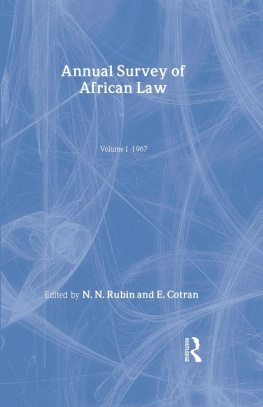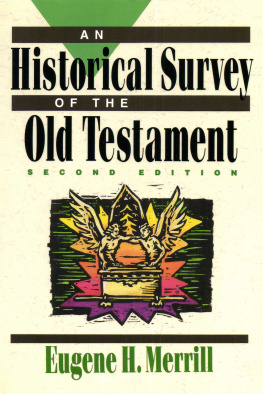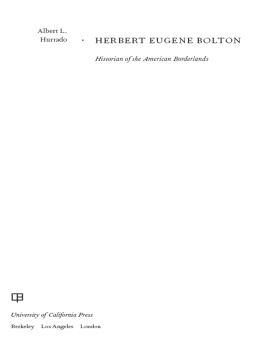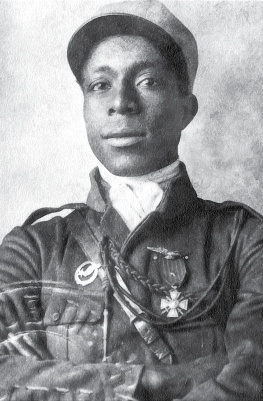Annual Survey of African Law
Volume I 1967
Annual Survey of African Law
Volume I 1967
Edited by
N. N. RUBIN, B.A., LL.B.
Advocate of the Supreme Court of South Africa and the High Court of Swaziland
Lecturer in African Law, School of Oriental and African Studies, Institute of Advanced Legal Studies, University of London
and
E. COTRAN LL.B., LL.M., DIP.I.L.
of Lincolns Inn, Barrister at Law
Lecturer in African Law, School of Oriental and African Studies, University of London
First published 1970 by Frank Cass Publishers
This edition Published 2013 by Routledge
2 Park Square, Milton Park, Abingdon, Oxon OX14 4RN
605 Third Avenue, New York, NY 10017
Routledge is an imprint of the Taylor & Francis Group, an informa business
Copyright 1970 N. Rubin and Cotran
All rights reserved. No part of this book may be reprinted or reproduced or utilised in any form or by any electronic, mechanical, or other means, now known or hereafter invented, including photocopying and recording, or in any information storage or retrieval system, without permission in writing from the publishers.
Notice:
Product or corporate names may be trademarks or registered trademarks, and are used only for identification and explanation without intent to infringe.
ISBN 13: 978-0-7146-2601-7 (hbk)
This is the first in a series of annual volumes which will aim to review the principal legal developments that take place in the countries of sub-Saharan Africa.
The series is intended mainly to enable those who have an academic or a professional interest in African law to keep abreast of recent changes in the various branches of the different legal systems of Africa, on as broad a basis as possible, both geographically and in terms of subject-matter. Our object will therefore be to assemble, for each of the years surveyed, as much material as we can which describes and comments on the legislation, and the decisions of the courts, in African countries.
It may not always be possible to make each annual survey as comprehensive as we would like it to be. The degree to which we are able to do so will depend to a very large extent on our ability to overcome the two major problems which arise in relation to all continent-wide studies on African law: the shortage of knowledgeable contributors on the great variety of African legal systems; and the ability of those contributors who are available to obtain suitable relevant material for the different chapters, from the documents which are scattered throughout a vast number of statutes and other official publications, journals, law reports and court records.
Both factors have limited the scope of the present volume. Notwithstanding these difficulties, it has still proved possible to include chapters dealing with all the countries of Africa within the Commonwealth, and a substantial number of accounts covering legal events and developments in countries outside the Commonwealth. Indeed, although we were unable to obtain contributions on all of the Francophone African countries, we were fortunate in being able to provide sample chapters dealing with two of them (The Federal Republic of Cameroun, and the Democratic Republic of the Congo) and arrangements are being made to ensure that a more extensive coverage is given to them in subsequent Annual Surveys of African Law. Other ommissions, which will be remedied in suceeding volumes, are Liberia and the East African Community. South Africa is, of course, adequately dealt with in the Annual Survey of South African Law, and will not be treated in this series.
The arrangement of the chapters follows the division already mentioned, namely that into Commonwealth and non-Commonwealth countries. This seemed to us to represent the most satisfactory of the various ways of grouping the countries, because it is relevant to the similarities which exist in the judicial and legal systems of the Commonwealth countries as well as to the received law (the Common law of England) which they share; while the other countries derive similarities in their law as well as their legal systems from the codified laws and the legal structures of continental Europe. It is as well to recognise, however, that this arrangement is by no means watertight. Within the Commonwealth grouping, four countries Botswana, Lesotho, Rhodesia and Swaziland differ from the others in that their received law derives from the Roman Dutch law of South Africa; while, among the non-Commonwealth countries, Cameroun and the Somali Republic have received part of their law from the Common law tradition by way of Nigeria and India respectively and the Sudans received law is, to a very large extent, the same as that of any country in the Common-wealth African group.
The selection of matter to be included in each of the chapters in the Annual Survey was, of course, left to each of the contributors. Though some attempt was made to achieve the coverage of approximately the same range of topics in relation to each of the countries whose laws were surveyed, differences resulted inevitably from the character of the legal systems being described and the nature of the changes introduced, in legislation or through the courts, during the period under review. Some of the authors also found it necessary to include a greater degree of explanatory material dating from earlier years, just as others found it impossible to provide an adequate account of legal developments without straying slightly beyond the final limit of the 1967 calendar year. Variations of this kind are to be expected in a work whose scope is as wide as this is. To insist on adherence to a single pattern for each of the chapters would have been to impose an entirely artificial uniformity on the structure of the book, at the cost of clear and easily comprehensible descriptions of the significant developments which occurred during 1967.
One special problem faced us in regard to the content of this Annual Survey. It arose from the developments in Nigeria during 1967, which culminated in the decision of the Military Governor of the former Eastern Region to announce the secession of the region from Nigeria, and his simultaneous declaration that it had become the independent Republic of Biafra. Since the civil war which resulted continued throughout 1967, these developments and other legal material concerning the former Eastern Region are dealt with both in the Chapter on Nigeria and in that on Biafra.
We should like to express our thanks to Mrs. M. Correia de Mattos for her help in translating Professor Coissoros chapter from the Portuguese, and to Mrs Patricia Lawrence, of Messrs. Frank Cass & Co., for her help and patience in dealing with the manuscript material for this volume.
N. N. R.
E. C.
CONTENTS
West Africa
. By A.N. Allott, M.A., Ph.D., Professor of African Law, University of London
. By A.V.J. Nylander, LL.B., LL.M., Ph.D., Acting Dean, Faculty of Law, University of Lagos, and A.B. Kasunmu, LL.M., University of Ife
. By U.U. Uche, LL.M., Ph.D., of Grays Inn. Barrister at Law, Lecturer in A frican Law, School of Oriental and A frican Studies, University of London
. By U.U. Uche
. By U.U. Uche
East Africa
. By E. Cotran, LL.B., LL.M., Dip.I.L., of Lincolns Inn, Barrister at Law, Lecturer in African Law, School of Oriental and African Studies, University of London








